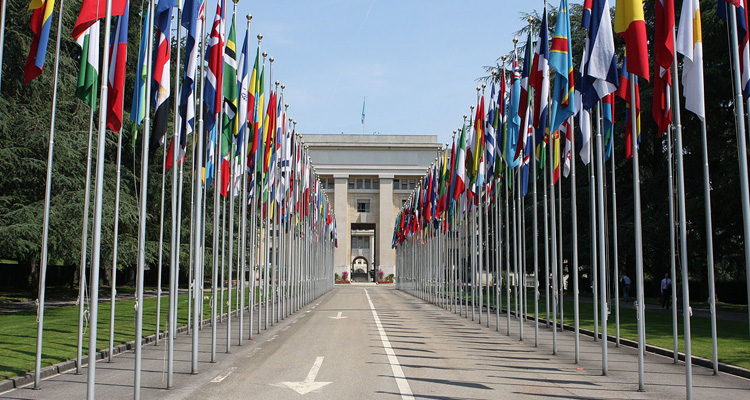When Catholic Studies and the Terrence J. Murphy Institute for Catholic Thought, Law and Public Policy gave me the opportunity to be the first intern to work with the Caritas in Veritate Foundation, an organization that provides research support for the Catholic voice in Geneva, it was an easy decision, even if it meant putting off the bar exam. Primarily, I worked alongside the brilliant, faithful and joyful men and women at the diplomatic mission of the Holy See to the United Nations in Geneva. Thus, my shorthand explanation in casual conversation that “I work for Pope Francis” was not far off the mark.
The relatively small city of Geneva (less than one-third the size of the Twin Cities area) punches well above its weight in terms of impact on the international scene. Overlooking Lake Geneva and the Alps, at the former site of the League of Nations, sits the sprawling United Nations Office at Geneva. Near it are the headquarters of the World Trade Organization, World Health Organization, International Labor Organization, World Intellectual Property Organization, International Committee of the Red Cross and a slew of other international organizations, both United Nations-affiliated and independent. So much of the work of the U.N. system takes place in Geneva that its workers are fond of saying, “In Geneva, we prepare and bake the cake, while in New York they eat the cake.”
With the array of organizations dealing with complex international issues, it requires presenting an informed and substantive voice. For a small diplomatic mission such as the Holy See, whose dozen or so staff and limited funding pale in comparison to the sprawling missions of the larger nations, it is not always possible to keep up with all the meetings and events in Geneva and find the time to do the necessary research. This is where the Caritas in Veritate Foundation comes in, connecting with a network of Catholic academic and other experts around the world to provide briefings and reports on issues ranging from human trafficking and modern slavery to patents on genetic resources to weaponized drones to religious freedom.
Perhaps the best part was the chance to work under the leadership of a highly respected veteran of multilateral diplomacy, H.E. Archbishop Silvano M. Tomasi, the apostolic nuncio in Geneva. Working multilateral diplomacy requires navigating a dizzyingly complex web of relationships, an art of which he seemed to be a true master.
A perk of working at the Holy See Mission was meeting some of its many interesting guests – foremost among them the Patriarch of Maronite Catholics, Cardinal Bechara Boutros Raï. As leader of the largest Christian community in Lebanon, he came to Geneva to address the international community on the dire situation of Christians in the Middle East and the overwhelming refugee crisis in Lebanon, a tiny country the size of Connecticut that has taken in 1.5 million refugees from the civil war in neighboring Syria.
I realized the most important impression my time in Geneva left on me only after I returned home. I met Raï again during his recent visit to the Twin Cities. He met with two Maronite parishes here – one small part of a vaster U.S. tour that included meeting President Obama. His Geneva talk made the world seem a small place. And when I met him again in more familiar surroundings, the world and our human community, whether VIPs or friends, seemed even smaller still.






